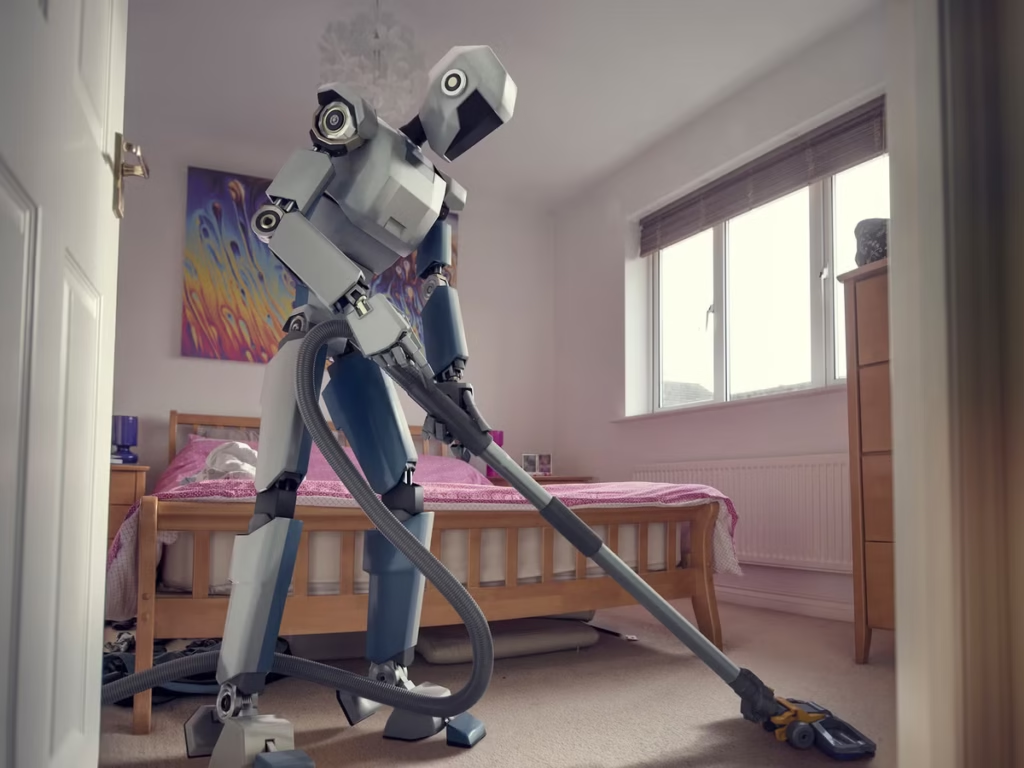The Robots Are Coming for Your Job — And It’s the Best Thing That Could Happen to Humanity
Imagine waking up in 2030. Your breakfast is prepared by a sleek kitchen bot, your car repairs itself overnight via a robotic diagnostics tool, and grocery deliveries arrive via AI-driven drones. Work? It’s not about clocking in at a warehouse or slogging through spreadsheets. Instead, you spend your days designing immersive virtual worlds, mentoring AI systems, or launching a passion project funded by Universal Basic Income (UBI).This isn’t fantasy. Automation is accelerating faster than most realize, and the biggest societal shift since the Industrial Revolution is already here. But this time, the disruptor isn’t steam engines or factories — it’s robots that don’t sleep, complain, or demand weekends off.The real question isn’t if robots will replace jobs — it’s how we’ll redefine what it means to be human when they do.
Part 1: The Rise of the Machines — Why Robots Are Unstoppable
1.1 The Robot Takeover is Already Here
From Amazon’s warehouse droids to AI-powered baristas in Tokyo, robots are quietly infiltrating every industry:
- Manufacturing: Foxconn (Apple’s supplier) slashed 550,000 human jobs by replacing them with robots. Result? A 250% productivity surge.
- Food Service: Spyce Kitchen’s robot chefs in Boston serve 300 meals per hour.
- Retail: Lowe’s “LoweBot” guides customers, checks inventory, and speaks 9 languages.
But the biggest leap is coming with general-purpose robots like Tesla’s Optimus or Boston Dynamics’ Atlas. These machines aren’t programmed for one task — they learn, adapt, and handle complex workflows.
1.2 Why Resistance is Futile
Robots aren’t just efficient — they’re cheaper, safer, and infinitely scalable:
- Cost: A warehouse robot costs $8/hour (vs. $25/hr for human labor).
- Reliability: Machines don’t get carpal tunnel, take sick days, or unionize.
- Scalability: Need 1,000 robots? Rent them via the cloud.
Human labor’s fatal flaw? We’re squishy, expensive, and prone to chaos.
Part 2: Universal Basic Income — The Lifeline of the Post-Work Era
2.1 Why UBI is Inevitable
When robots handle 60-70% of repetitive labor (McKinsey, 2023), traditional jobs vanish, and wages collapse. UBI — regular cash payments to all citizens, no strings attached — isn’t a socialist pipe dream. It’s survival.
- Finland’s 2020 UBI trial cut stress levels by 25% and boosted entrepreneurship.
- California’s Stockton Pilot saw 35% of recipients find full-time work because financial pressure eased.
Critics rant about “free riders,” but data shows UBI doesn’t kill ambition — it unlocks it.
2.2 The Dark Side of Automation: What Happens Without UBI?
Without a safety net, robot-driven unemployment risks:
- Mass Poverty: 800 million jobs lost globally by 2030 (World Economic Forum).
- Social Unrest: France’s Yellow Vest protests x 1,000.
- Talent Collapse: Millions stuck in survival jobs, unable to innovate.
UBI isn’t charity — it’s an investment in human potential.
Part 3: From Workers to Creators — The New Human Playbook
3.1 Your New Job Description: Think, Create, Dream
Robots excel at the predictable. Humans thrive in the messy, creative, emotional realm. Tomorrow’s jobs?
- AI Mentors: Train bots to handle nuanced tasks (e.g., conflict resolution).
- Experience Architects: Design hyper-personalized healthcare, education, and retail journeys.
- Problem-Solving OGs: Tackle crises like climate change with freed-up brainpower.
A former Amazon warehouse worker used UBI to pivot into robotics engineering — and now earns triple her old salary building maintenance bots.
3.2 Skills That Make You Robot-Proof
Forget coding — soft skills will be gold:
- Emotional Intelligence: Empathy, humor, and cultural nuance.
- Creative Courage: Idea generation without fear of failure.
- Adaptive Thinking: Pivoting careers 4-5 times in a lifetime.
Remember: No robot nails a stand-up comedy gig — yet.
Part 4: The Ethical Minefield — Who Controls the Bots?
4.1 The Corporate Power Grab
Danger lurks if automation benefits only the 1%:
- Tech giants own 90% of AI patents.
- Billionaires could exploit robo-workforces for near-zero labor costs.
Solution? Tax robots like workers. Bill Gates proposes robot taxes to fund UBI and curb inequality.
4.2 Are We Ready to Redefine “Purpose”?
For centuries, identity = job title. But when robots take over, we’ll need new metrics of success:
- Community impact
- Artistic expression
- Personal growth
Will society collapse into hedonism… or elevate into an era of Renaissance-like creativity?
Epilogue: The Choice is Ours
The robot revolution isn’t a dystopia — it’s a blank canvas. We can design a future where humans are obsolete… or one where automation liberates us from drudgery to finally chase purpose.
📌 Liked this deep dive? Crave more? Smash that Follow button on News Kreaators for weekly breakdowns of AI, tech, and the wild future ahead.


